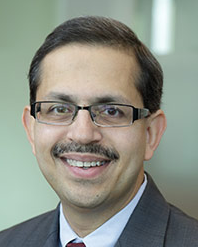First published on the Patient Empowerment Network blog.
We think of the National Cancer Institute (NCI) as more of a biomedical research-oriented institution than a patient-centered one, but there is research being done at that institution on patient satisfaction and patient-centeredness.
Neeraj Arora, PhD is a Program Director for Patient-Centered Care Research and acting chief of the Outcomes
First published on the Patient Empowerment Network blog.
We think of the National Cancer Institute (NCI) as more of a biomedical research-oriented institution than a patient-centered one, but there is research being done at that institution on patient satisfaction and patient-centeredness.
Neeraj Arora, PhD is a Program Director for Patient-Centered Care Research and acting chief of the Outcomes
Research Branch, Applied Research Program, Division of Cancer Control and Population Sciences at the NCI.
For almost two decades, Arora has been conducting research focusing on patients and the patient’s perspective. He is currently building a program of research that would facilitate ongoing assessment, monitoring and improvement of patient-centered care processes as part of routine cancer care delivery.
Arora was diagnosed with aggressive non-Hodgkin Lymphoma in 1994 at age 25 and underwent intense treatment for 3 years, which resulted in long-term remission. However, in 2007, he was diagnosed with congestive heart failure, a late effect of the cancer treatments. His journey through cancer diagnosis, treatment and survivorship has left Arora with first hand experience as a cancer patient and survivor and he has used this experience in his studies and research.
“When I was in my second year of a PhD program in health systems engineering, I was diagnosed with aggressive non-Hodgkin lymphoma. My advisor at that time told me to view my experience as the most in-depth internship I could ever get in the healthcare industry. He told me to keep myself focused and encouraged me to log my observations on quality of care, that it would be the best education of the health system that anyone could provide. I took his advice to heart. He was right. My experience opened my eyes and kept me focused on the idea of patient-centered care. I felt like this was a place where I could make a contribution.”
Arora joined NCI in 2000 and started his career in patient-centered research at the Outcomes Research Branch. The main focus of this branch is to fund research that emphasizes the patient’s perspective, but Arora explained that prior to funding the research, they need to conduct a lot of background scientific work to justify the area of study.
Arora focuses his studies on the quality of patient care received by cancer patients. In a study done in 2011 on cancer patients, Arora assessed cancer survivors’ perceptions of the quality of their follow-up care. Although patients initially reported satisfaction with their care, when asked specific questions, some issues arose:
“Although only 4% of survivors reported problems with access to specialists, 33% reported that their physician did not always encourage them to ask questions, 59% reported limited or no discussion on health promotions and prevention topics, and 77% indicated that their physician had less than excellent knowledge of them as a person.”
It seems that patients were least satisfied with advice and encouragement on living with their illness:
“When asked, ‘Did your follow-up care doctor or someone from your doctor’s office or clinic give you the help you wanted to make changes in habits or lifestyle that would improve your health or prevent illness?’, 61.2% reported suboptimal quality (responses were yes, definitely; yes, somewhat; no).”
Arora is interested in the cancer survivor’s quality of life and how they are helped by their physician and/or provider.
He is researching this field with his colleagues and led the development of NCI’s Patient-Centered Communication in Cancer Care monograph.
I asked Arora what he thought about going online for information, patient empowerment, and patients helping other patients.
Arora answered,
“I believe on going online to get answers. I have been a member of ACOR (Association of Cancer Online Resources), since the early 90s.
“I cannot say enough about the power of learning from patients. There is somebody out there who has been in your shoes –You have questions and you post them online and someone answers. The emotional support is amazing.”
But he also believes that the physician and institution should play a part and guide the patient through online research if that is needed. There needs to be a joint effort between the patient, the patient’s family and the medical team to get the patient the information needed to help him cope with his illness.
I asked Arora what his closing thoughts were on the subject of patient engagement and empowerment,
“We need to provide patients with an ongoing system that fulfills their needs, so that it’s not just about getting great care in the initial phase in the hospital, but is followed up with an ongoing stream of information and support during their time at home in between visits.
We need to have the medical institutions work together with the support and advocacy groups to get patients the help that they need.
My great concern is that the fact that studies show that 25% of elderly cancer patients have 5 other chronic illnesses. They also show that people with 5 or more chronic illnesses see 12 or more doctors a year. We really need to work on how we are going to coordinate cancer care in this kind of world.”
Resources:
http://jco.ascopubs.org/content/29/10/1280.abstract
Click to access JCO.2012.47.6705.full.pdf
http://appliedresearch.cancer.gov/areas/pcc/communication/monograph.html
http://cancercontrol.cancer.gov/research-emphasis/quality-of-care.html
Arora NK. Patient engagement in a rapidly changing communication environment: reflections of a cancer survivor. Journal of the National Cancer Institute Monographs, 2013;47:231-232.
Arora NK. Importance of patient-centered care in enhancing patient well-being: a cancer survivor’s perspective. Quality of Life Research. 2009;18:1-4.









